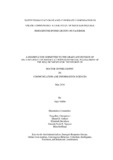Please use this identifier to cite or link to this item:
http://archive.nnl.gov.np:8080/handle/123456789/96| Title: | Institutionalization of anti-cyberhate coordination in online communities: a case study of Haiti earthquake emergent response groups on Facebook |
| Authors: | Subba, Rajib |
| Keywords: | Online social platform Online communities Earthquake Haiti Institutionalization |
| Issue Date: | 23-Feb-2018 |
| Abstract: | To understand how emergent response groups institutionalize anti-cyberhate coordination, I conducted a longitudinal study using online data collected from two Facebook groups involving more than 700,000 members following the 2010 Haiti earthquake. Netnography, an ethnographic method to study the culture of online communities, was chosen to analyze coordination activities of netizens who joined hands to help earthquake victims. Using Scott’s model of institutional elements and recent theoretical development in coordination theory, I retraced how institutional carriers emerge and evolve during the formation of anti-cyberhate mechanisms within self-emerging online collectives. As it seems critical to bring social activists together, data analyses uncover four phases of institutionalization of online response groups. Haiti earthquake Facebook groups evolved from ad-hoc and improvised self-coordination to institutionalized self-governance. Initially, netizens engaged themselves in loosely coordinated actions to contain hatred messages, and eventually their coordinated action evolved into legitimate expectations, rules and values, and routinized monitoring and reporting. Moreover, evidences were found of institutional stickiness mediated by relational coordination. reinforcement of anti-cyberhate coordination was positive when members expressed shared goals and mutual respects, and when their problem-solving communications were frequent and accurate. However, institutional persistence of emergent responders was limited by a short-time horizon once spontaneous event-driven vested interest faded. This dissertation highlights the importance of sustainability emergent response online groups in the wake of their usage in crisis responses in recent times. This dissertation is an initial step to build knowledge on institutionalization of emergent response online communities. It not only adds on the existing literature on online communities but also tries to fill the research gap on emergent response online communities for crisis response. This dissertation also has practical contributions for crisis responders to understand how emergent response online communities behave in its life cycle, which helps to understand them during four phases of crisis response. |
| Description: | A dissertation submitted to the graduate division of the university of hawai‘i at mānoa in partial fulfillment of the requirements for the degree of Doctor of Philosophy in Communication and Information Sciences, 2014. |
| URI: | http://103.69.125.248:8080/xmlui/handle/123456789/96 |
| Appears in Collections: | 300 Social sciences |
Files in This Item:
| File | Description | Size | Format | |
|---|---|---|---|---|
| 1Dissertation_RajibSubba_MoE_2014.pdf | 3.64 MB | Adobe PDF |  View/Open |
Items in DSpace are protected by copyright, with all rights reserved, unless otherwise indicated.